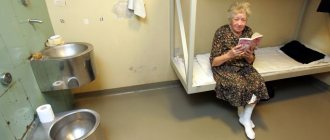The concept of a maximum security colony
Info
A maximum security colony is an institution that has a correctional purpose. It has a closed type. Created to ensure that persons who committed acts of a criminal nature served their assigned punishment. This applies only to those who have committed acts classified as serious, and they pose a danger to the public.
Persons against whom a trial has been held are placed in institutions of this type. Only particularly serious crimes that were committed for the first time or of moderate severity in the presence of a relapse are taken into account. The colonies in question involve the establishment of rather harsh conditions, including:
- a large number of restrictions are provided;
- complete isolation from society is established.
Info
Citizens are placed here only if there is a corresponding decision from a judicial authority
Differences from prison
If we talk about prison, then this term has a general meaning. Its purpose in everyday life is associated with an indication of a correctional-type institution where persons who have violated legal norms are placed. However, a certain difference can be distinguished between the terms under consideration. It lies in how the movement of a person is restricted within the specified territory.
Info
Persons who have committed crimes are located strictly within their cells. They have the right to go for a walk only once a day. Such transitions are made accompanied by authorized employees. Such features are inherent in prison. The colony is supposed to be a closed area where prisoners are kept. Most often, this is a separate village intended for these purposes.
This institution has different zones, including barracks, shops, administrative bodies, libraries, etc. It should be noted that a colony involves a freer type of detention for prisoners compared to a prison. At the same time, there are also colonies in the country where criminals who are especially dangerous to society are placed.
In these types of institutions the following division of convicts may be established:
- ordinary;
- strict;
- especially strict regime.
Which of these regimes a person will be placed in depends entirely on the decision of the judicial authority. The prison indicates that the movement of criminals will occur using a strictly designated area. The route is most often built in such a way that citizens go from the cell for a walk, then to work and back to the cell.
The regime assumes that free movement is prohibited. Persons who have committed grave and especially grave acts are kept in cells.
Attention
It is worth noting that if a citizen suffers from a serious illness, he cannot be sent to prison. Such a person can only be assigned to a colony.
How is a short visit in prison?
As a rule, all dates begin with the transfer of food. But this is not even a meeting stage, but a separate procedure - transfer. It’s just that most often relatives combine a date with food transportation.
The food norm is set for 2021 at 20 kg. Everything that was brought is carefully inspected.
The order of the meeting is as follows. A short-term visit in prison is simply like a four-hour conversation through glass. For communication there is a telephone through which you can talk. But in principle you can hear it without it.
The telephone is rather intended for those cases when several dates are taking place in the room at the same time, and a strong noise of voices is created.
The convict and his guest are sitting on chairs and talking . At the same time, there is always a colony employee present who listens to what you say.
Difference from a general regime colony
The delimitation of these definitions is described in the provisions of Articles 121 and 122 of the Criminal Code of the Russian Federation. They affect several provisions, which vary significantly for similar institutions. This also applies to dates and the amount of money that is acceptable to spend while in this place. If a citizen is kept in a general colony, then the citizen is kept in it under more simplified conditions compared to the strict type of institutions.
The differences are that:
- Categories of citizens placed in an institution. The general regime provides for the detention of persons who have violated the law for the first time. At the same time, they may commit acts of grave, minor or moderate gravity. A strict regime is assigned to those who have committed a crime classified as especially serious for the first time or those who repeatedly commit serious acts.
- The amount of money that can be spent. In general conditions - three minimum wages, in strict conditions - this amount is reduced to two minimum wages.
- Dates. During the year, in the general regime, a citizen is allocated time for four long and six short rooms. Under strict conditions, three visits per type are allowed.
- Transfers. Under normal conditions, it is possible to receive no more than six parcels and parcels in 12 months. During the same period, in strict mode, it is permissible to accept 4 parcels and parcels.
Important
Currently, restrictions regarding the weight of gears apply. The maximum weight category for parcels is 50 kilograms.
What is the difference between strict regime and general regime?
All colonies are organized according to the same principle . Their territories are divided into working and residential areas. There is also a place for leisure activities: this could be a club, library, cafe, canteen, etc. However, the conditions of detention can be very different.
If, for example, in a colony-settlement you can visit a neighboring dormitory and move freely throughout the entire territory, then in a high-security prison, walks are rationed, and at night prisoners are locked in a common cell.
It is clear that the severity of the crime determines the punishment and the place where a particular criminal will serve it. However, in each camp there are also internal regimes that the convict can “earn.” These modes can be:
- lightened;
- ordinary (general);
- strict.
It is worth starting to consider the differences between a general and strict regime penitentiary institution with the conditions that are established in them by default. Under normal conditions, the following restrictions are defined for a general regime camp:
- spend up to 3 minimum wages per month on personal needs, in addition to earnings;
- 6 short-term and 4 long-term dates per year;
- 6 parcels or parcels and 6 parcels per year;
- walks are limited only by daily routine and work.
Standard conditions for a maximum security colony:
- You can spend no more than 2 minimum wages per month, in addition to the money earned in the colony;
- 3 short-term and 3 long-term dates per year;
- 4 parcels and 4 parcels per year;
- walks are not prohibited or limited in time.
Even a cursory glance shows that the conditions of detention in maximum security colonies are one and a half times harsher.
But even the most “inveterate” convict can deserve relief. In order for the administration to transfer a convicted person to lighter conditions, it is enough not to violate the established rules and work diligently.
In light conditions in a general regime colony, restrictions on spending money per month are completely lifted, the number of long-term visits increases to 6, and the number of parcels and parcels that can be received per year increases by 2 times - you can receive up to 12 parcels.
Facilitated conditions in a maximum security penal colony almost completely replicate the standard rules for keeping prisoners in general security camps.
Thus, under relaxed conditions, a convicted person can spend 3 minimum wages, the number of both short-term and long-term visits increases to 4, and the number of permitted parcels and parcels increases to 6 per year.
Reference. According to the law, a convicted person placed in a high-security correctional facility must first serve at least 9 months under general conditions. If, after this period, there are no penalties from the administration against the convicted person and he has conscientiously performed his duties, he is transferred to lighter conditions.
In contrast to the lighter ones, there are also strict conditions. Under strict conditions, the convict stays in a locked room and has the right to walk for an hour and a half - these conditions are the same for both colonies.
The changes are most significant for general regime colonies. Here the conditions of detention are tightened 3-4 times. A convicted person can spend only 2 minimum wages per month on himself, and only 2 meetings with relatives, 3 parcels and the same number of parcels are allowed per year.
Compared to ordinary conditions, the strict conditions in a maximum security colony worsen the situation of the convicted person by approximately 2 times . The convicted person is allowed to spend only one minimum salary per month (about 11 thousand rubles). There are several meetings with family and friends per year: 1 long and 2 short-term. Allowed to receive 2 parcels and 2 parcels.
Conditions in which criminals are kept
In correctional colonies, certain conditions and rules are established in accordance with which citizens who have violated the laws are kept. Living conditions are completely dependent on which contingent will be selected. In addition, an important factor is the staff of the correctional organization and its management.
Info
However, the conditions in this case are strictly regulated. This also affects how much money can be spent, the number of parcels and other important provisions for the prisoner.
How to get permission to date?
Only close relatives have the right to long-term visits.
So who is allowed in? These include the following persons:
- Legal spouses;
- Parents;
- Children;
- Brothers and sisters;
- Adoptive parents and adopted children;
- Grandmothers and grandfathers;
- Grandchildren.
In theory, illegitimate wives cannot have the right to long-term visitation . But is everything so clear in this matter? How can a common-law wife get a date with a convicted person?
To get the long-awaited date, you will need to pity the head of the colony. The head of the correctional institution has the right to independently authorize or prohibit visits with non-close relatives.
Therefore, in order to go on a date, you must first submit a written request to the head of the colony.
It’s good if your husband has impeccable behavior, and the head of the colony is lenient towards other people’s requests.
To be more convincing, you can provide a certificate of cohabitation, which can be requested from the housing and communal services department.
What certificates are needed for a long visit in a colony?
What to cook for a date? Regardless of whether you are a close or distant relative, all visitors will need to undergo a short medical examination before the date.
Each correctional institution may have its own list of certificates that may be required for this.
But, in general, the following medical documents are required:
- Blood test for HIV, RW (syphilis), hepatitis C;
- Fluorography;
- Gynecologist's report;
- Conclusion of a venereologist;
- The therapist's conclusion.
The hospital and the colony itself will tell you how to obtain these certificates.
Obviously, this is done to ensure that none of the visitors can bring into the zone such serious diseases as tuberculosis, hepatitis, and sexually transmitted diseases.
In addition to medical documentation, it is required to submit documents that would confirm the fact of relationship with the convicted person and its degree. Wives carry marriage certificates, parents and children – birth certificates.
No one will be allowed on a date without an identification document.
How is the colony organized?
Regardless of where the institution is located, it is necessarily divided into residential and administrative zones. In the residential area, premises such as a dining room and library, a medical center, an administration and a bathhouse are most often located. To hold prisoners, cells are provided in which there are from thirty to fifty people. Citizens sleep on bunks with several tiers.
At the same time, a standard has been established for the number of meters per person. If it is violated, penalties will be applied to the administration. There must be at least seven squares per prisoner. The territory must be equipped with an area intended for walking and an isolation ward where those who violate the established rules of detention are placed.
Nuances of keeping female representatives
The grounds on which a woman can end up in such a colony are similar to those that apply to men. This is the commission of acts classified as grave and especially grave. There are some differences between institutions that house men and women. However, the conditions were created in such a way that the peculiarities of the structure of the female body, including their psychology and the subtleties of adaptation in society, were not taken into account.
Women have a harder time coping with the time they are in prison. This is due to the distance from relatives, the peculiarities of the regime and the lack of necessary conditions in terms of hygiene. For the category of citizens in question, general conditions of detention apply. This also applies to the number of transfers, money that can be spent and dates.
Info
Thus, only those persons who have committed acts classified as grave or especially grave are kept in strict conditions. If a person commits slight violations of the law even several times in a row, he cannot be accommodated in such an institution.
How does a long meeting with a convicted person go?
A long meeting takes place in separate rooms of the colony or in a hotel, which is located for these purposes on its territory. It costs money, we have previously talked about the approximate cost of a three-day date.
On a long date, you can cook in the kitchen . Kitchens are laid out differently in different prisons. In some places, each meeting room has a separate kitchen, in others there is one kitchen for several rooms. So sometimes you have to wait in line.
There is an opportunity to go outside, watch TV and DVDs with films. For three days there is no regime for convicts; they do not have to get up early and go to formation. It's a little vacation for them.
Visiting rooms are generally dirty . Therefore, it is better to take something with you to clean tables or dishes, take clean bed linen.
There are always unpleasant odors in the room, because rooms such as the toilet, smoking room and kitchen may be located close to each other.
Every meeting for a convicted person is a holiday, and its end is a terrible tragedy. Parting with loved ones is always accompanied by tears.
Visits in prison have strict restrictions. The convicts were recognized by the court as dangerous to society and requiring isolation.
Control over their lives does not stop even when they go on short or long-term visits with relatives.






